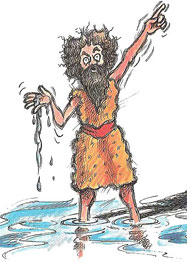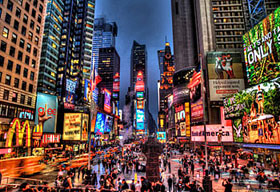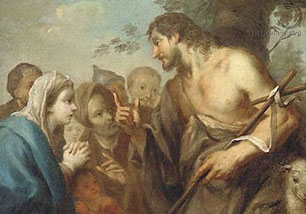
Reflection by Deborah Beach Giordano
Not Again?!
 Well, here he is again, that weirdo wrapped in moth-eaten camel skin, shouting about repentance and calling people names. Every year around this time John the Baptizer shows up in our readings, and every year he makes us feel uncomfortable, just as he must have done back in the day.
Well, here he is again, that weirdo wrapped in moth-eaten camel skin, shouting about repentance and calling people names. Every year around this time John the Baptizer shows up in our readings, and every year he makes us feel uncomfortable, just as he must have done back in the day.
And yet we are told that many people were drawn to his message. “People from all over the region” came to hear John’s preaching, confess their sins, and be immersed in the river, symbolically beginning their lives anew. It was an opportunity for a fresh start, a break from old patterns and habits, a washing away of the dust and dung of the life that had preceded it. Now they felt ready to greet the Coming One that John foretold, their souls cleansed and refreshed.
But what’s strange — almost incomprehensible from our standpoint — is who it was that came to John “confessing their sins.” These weren’t murderers, rapists, or robbers; there were no sinners with a capital “S” assembled on the riverbank, but just regular, everyday folks. Like us. Imagine that. Imagine thinking of ourselves as “sinners.”
Which Kingdom?
That’s not how things are. We don’t think of ourselves in religious terms, but in worldly ones. We’re not concerned with the condition of our souls or the state of our relationship with the Beloved; instead, we care about “right thinking:” what’s important is aligning our thoughts, hopes, and beliefs with what the culture tells us is correct and true. It’s all about marketing.
 We’ve succumbed to what’s popular, “what works;” we’ll do almost anything in order to fit in. Our acceptance is conditional on our conformance; on our willingness to keep our mouths shut, our eyes down, and never to disagree. And — faithlessly and self-destructively — we acquiesce.
We’ve succumbed to what’s popular, “what works;” we’ll do almost anything in order to fit in. Our acceptance is conditional on our conformance; on our willingness to keep our mouths shut, our eyes down, and never to disagree. And — faithlessly and self-destructively — we acquiesce.
“Business as usual” requires that human minds, bodies, and souls be bent, shaped, and twisted to fit the mold of manufactured public opinion. It thrives on creating misery and unhappiness — and then marketing “cures”: that make our situation worse, training us to seek help from the very ones who hurt us.
It is no surprise that our shelves are lined with antidepressants, energy drinks, cannabis oil derivatives, and high-proof intoxicants — ineffectual remedies for the pain and confusion of living in a Kingdom of Lies. Our souls are sick, weary, and damaged from hatred, envy, and division; our silent suffering is a betrayal, a denial of reality. For the truth is that we were not formed for this, but for another life — another sort of kingdom entirely. The way of the world is killing us.
The Gift of Repentance
It is to an age such as ours and a people like us that John the Baptizer came, preaching repentance. This was not a doctrine of despair, not a condemnation, but an affirmation: what has been done and left undone can be revised, reversed; people can change, lives can be repaired. But there is no time to waste, no excuse to delay: the Lord could arrive any day.
To call people to confession is not an effort to humiliate or shame us, it is a promise of possibilities for new beginnings, and a challenge: in the name of the Lord we can Do Better. It is also a reminder — a cautionary statement, if you will — that we are imperfect beings, prone to mistakes, miscalculations, failings, faults, and outright misconduct. We don’t know everything. We can be wrong. We also hate to be wrong so fiercely that we will cling to our mistakes with foolish, sometimes frantic, destructive desperation — which the world encourages and exploits.
Confession is not only good for the soul, it improves our thinking, freeing us from the prison of inflexibility, anger, and fear, and opens our minds to different views and new possibilities. It also tenderizes our hardened hearts, as we recognize our own humanity — in common with others. We are no better than our sisters and brothers with whom we disagree; to believe otherwise is to situate ourselves with the Pharisees and Sadducees John denounced for their false sense of superiority and unwarranted conceit.
Power to the People
The herald of the Contrasting Kingdom was a genuine outsider with no connection to the corporate power structures, neither political or religious. John’s ministry was conducted far from Jerusalem, in the countryside of Judea, to regular folks without wealth or influence.
 These were people who had been excluded or exiled or ignored. They had experienced, first hand, how distorted and damaging “the way of the world,” could be. It was to them, out in the middle of nowhere, that God’s messenger came, proclaiming another way, another kingdom — a kingdom in which they were as much a part as any of the wealthy or well-connected. They were sought-after, valued citizen-servants of the Lord; their participation mattered, their lives were important.
These were people who had been excluded or exiled or ignored. They had experienced, first hand, how distorted and damaging “the way of the world,” could be. It was to them, out in the middle of nowhere, that God’s messenger came, proclaiming another way, another kingdom — a kingdom in which they were as much a part as any of the wealthy or well-connected. They were sought-after, valued citizen-servants of the Lord; their participation mattered, their lives were important.
Just as ours are.
Which brings John’s message — and the kingdom — back to us.
Clean Up Your Act
What better Season than Advent, what better time than now to renew our faith and reaffirm our participation in God’s Contrasting Kingdom?
We can begin by repenting: confessing, admitting, acknowledging that we are not perfect. We’ve made mistakes, said and done and thought hurtful things; we are sometimes wrong, misinformed, and even malicious; there are times when we have been envious, unreasonably judgmental, intentionally unkind, and insufferably smug. There is room for improvement.
And what a relief to be freed from the obligation to pretend that we are like gods, infallible and all-knowing! Confession saves us, as well, from the temptation to chose scapegoats as shields and disguises for our own imperfections (“She’s much worse than I am!”). We’re kinder, gentler people when we’re honestly human.
Cleansed from delusions and conceits, we can begin anew — as citizen-advocates of God’s Contrasting Kingdom. We will no longer be intimidated or subjugated by worldly norms and expectations, but proudly proclaim divine authority: above all other rules and regulations, all other patterns and prejudices, towers the eternal, glorious reality of God’s grace and goodness. What matters most is loving compassion, acceptance, and mercy. In all things we will strive to act accordingly.
Very Good
And God looked upon all that He had made, and indeed, it was very good.
~ Genesis 1:31
Simply put: God doesn’t make junk.
Creation is not a resource to exploit, but a sacred treasure to honor; a gift of amazing beauty and astonishing variety. As faithful guardians, we are called to nurture, protect, celebrate, and advocate for our planet and all who dwell upon it. We must counter the “business as usual” model that demands uniformity, opposing, in the name of the Lord, all efforts to force bodies, minds, and souls to conform to cultural “norms.”
We will bless and encourage the shunned, the shamed, the excluded, the ill, the aged, the impaired, the ignored, the ostracized. We will treat everyone with respect and compassion, seeking what is best, refuting what is hateful, hurtful, and destructive. We will act as if the Contrasting Kingdom is already present in this world.
It’s Not Easy
Living according to the Way of the Lord is not easy; it requires that we reject the programming and manipulation that surrounds us, and dwell in a counter-cultural “wilderness.” We are to view one another as companions on the Journey, rather than enemies and antagonists; we are called to seek the best rather than expect the worst; to uplift and encourage, to bless and not to curse.
It is not easy to admit that we do not have all the answers; we’ve been conditioned to lay claim to faultless intelligence and perfect wisdom — and we really hate to be wrong. But people make mistakes, misunderstand, mislead, and sometimes lie; we are not omniscient, and neither is anybody else. We are all merely — and gloriously — human: neither gods nor angels, but pretty special, just the same.

To live in our world as citizens of the Contrasting Kingdom is to embrace our inner weirdo: it is to be willing to live as far outside the norm as John the Baptist did (camel skin clothing and bug diet optional!). It is to reveal the Gospel in our way of living and our way of being: refuting all ugliness, hate, and division. It is to fearlessly, joyfully, proclaim God’s expansive, unlimited love.
May the Gracious Beloved encourage and empower your inner weirdo,
Deborah ✟
Suggested Spiritual Exercise
Prayer of Confession and Renewal:
With a humble and grateful heart, I confess: I am not perfect,
I don’t know everything — though I sometimes behave as though I do.
I get caught up in busy-ness and strife and my own ego,
and forget Whose beloved child I am.
I have been unkind and hurtful, self-absorbed and cynical,
pompous and judgmental —
holding others to standards I could not meet myself.
More than once I’ve messed up, majorly.
So here I am, Lord, feeling sorry for the harm I’ve done,
sad I’ve not done better — and resistant to admit it.
I’d much prefer that none of this was so.
Through You, I know, there is redemption and renewal —
a cleansing of the old, and a chance at a fresh start;
immerse me in the glorious possibilities of what may yet be,
wash away all ugliness, anger, and resentment,
let me arise in shining hope and courage to begin anew.
In the light of Your love I rejoice
praise the Lord, O my soul;
let all that lives, praise the Lord!
Amen